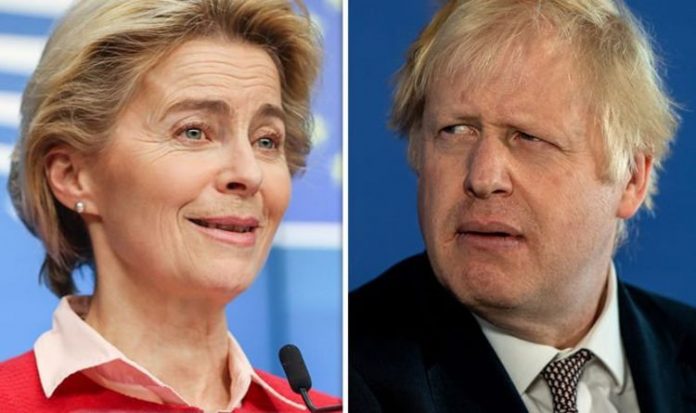At the end of summer, EU leaders struck a deal on a huge coronavirus recovery package after four days of bitter talks. The €750billion (£668billion) coronavirus fund will be used as loans and grants to the countries hit hardest by the virus. The remaining money represents the EU budget for the next seven years.
The talks began with a divide emerging between the hardest-hit nations and those intent on a more “frugal” package of measures.
Denmark, Sweden, the Netherlands and Austria all pushed back on an initial package of grants worth €500bn (£450billon), reportedly causing French President Emmanuel Macron to bang his fists in anger.
In the end, the £668billion, which will be doled out in the form of grants, will sit within – and be repaid out of – the EU budget, with each country shouldering the repayment proportionate to their existing contribution to the pot.
For example, Germany as the biggest net contributor will therefore be liable to pay back more.
This means that if Britain was still in the EU, it would have also been liable for a considerable amount.
In 2017, Germany, with a net contribution of €12.8billion (£11.68billion), was the largest contributor, followed by the UK, with €7.43billion (£6.55billon).
In an exclusive interview with Express.co.uk, Ashford councillor and general secretary of Labour Leave Brendan Chilton said about the Recovery Fund: “This is the first time in European Union’s history that they have agreed on a common fund that will be administered centrally and then sent round to member states.
“This is further centralisation of power in the EU. It is a good thing to support states that are in trouble, don’t get me wrong.
How is Boris Johnson handling the coronavirus crisis? Vote in our poll
JUST IN: Tony Blair ran up £1.2million bill using Queen’s Flight 677 times
The prominent eurosceptic added: “I am glad we are not contributing to it.
“I think if we were still members, our contribution would be the second-largest one.
“Germany’s is around £80billion.
“We would have been £70billion.”







